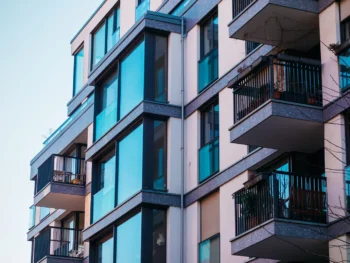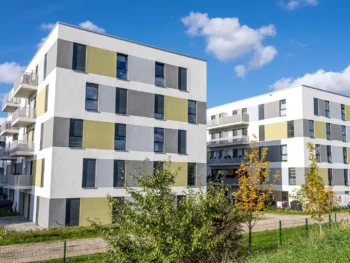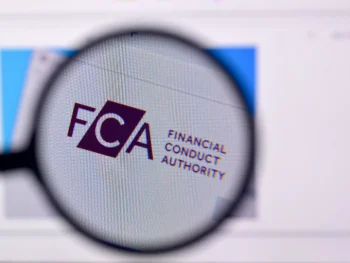Darren Bagnall of Flat Living Insurance gives us an insight into what major works are and the processes involved.
It’s important for residents and managers of leasehold blocks of flats to understand major works and the Section 20 procedure that must be followed when high-cost maintenance or improvements are carried out. Here we’ll be explaining what constitutes as major works, why they’re vital for the upkeep of the building, and how the section 20 consultation should be carried out.
What Would Constitute as “Major Works”?
Major works are substantial projects such as large-scale maintenance, repair work or significant improvements for the block of flats, which will affect the block’s service charge or reserve fund. Such works are carried out to ensure the proper functioning, safety and value of the block of flats.
Major works typically require careful planning, budgeting, and coordination. They often involve hiring contractors, obtaining necessary permits, and communicating with residents to minimise disruptions during the project.
Some examples of major works for blocks of flats include:
- Roof repairs and replacements
- Exterior redecoration
- Adding, removing or replacing cladding
- Lift replacement
- Façade refurbishment including window replacement
- Plumbing upgrades
- Electrical upgrades
- Fire safety enhancements
- Common area refurbishment
- Structural repairs
- Landscaping
- Renewable energy installations
- Waterproofing and damp-proofing
- Accessibility upgrades
Why Are Major Works So Important?
Without reactionary and planned-for maintenance, blocks of flats can quickly lose their ‘curb appeal’, quickly followed by their market value. This would be bad news for the landlord as well as for the individual leaseholders. Without necessary upkeep, blocks of flats can quickly deteriorate, allowing damp and mould to flourish. Vital machinery such as lifts can breakdown, leaving residents and their visitors at risk and outdated elements (such as old windows and basic entry systems) can affect the day to day lives of residents.
Some major works are needed to ensure the health and safety of residents. Fire alarm systems, door entry security and damp-proofing must be maintained and upgraded as necessary to avoid any harm. Besides the obvious necessity for structural and security-related repairs, major works also include planned improvements and refurbishment. These are just as important for the sake of resident satisfaction and maintaining the value of the block of flats.
Who Pays for Major Works?
Major works can be expensive, with the costs usually split between the leaseholders and charged via their annual service charge (or through a reserve fund if one is available). Even if the costs are shared with multiple leaseholders, bills can still be significant for individuals. It’s for this reason that landlords and property managers are legally obligated to follow the Section 20 consultation procedure.
The Section 20 Consultation
The Section 20 consultation procedure is a set of legal requirements set out in the Landlord and Tenant Act 1985. It comes into force if cost of major works exceeds £250 per leaseholder.
The procedure ensures that leaseholders are properly consulted during the planning stages for any major works or long-term agreements. It was enacted to make sure that landlords and property managers work with transparency and fairness while taking leaseholder opinions into account.
The consultation procedure consists of three stages:
- Notice of Intention
Firstly, the landlord or property management company are required to serve a “Notice of Intention” to the leaseholders. This notice must detail the proposed works and the reasons behind them and invite leaseholders to submit their responses within a specified timeframe (usually 30 days).
- Obtaining Estimates
Once the timeframe has elapsed, the landlord or property management company must provide leaseholders with at least two estimates for the proposed works. These estimates should come from different contractors and should be sent to the leaseholders along with a summary of the responses received from all residents. Leaseholders should then be given another opportunity to submit their comments.
- Notice of Reasons
After considering the estimates and the observations of leaseholders, the landlord or property management company must send a “Notice of Reasons” that includes details of the chosen contractor, the costs involved, and any other relevant information. Leaseholders have the right to seek further information and potentially challenge the choice of contractor or the costs. If leaseholders believe that the costs are unreasonable, they can apply to the First Tier Tribunal (Property Chamber) for a determination.
It’s important to note that the Section 20 procedure may vary slightly depending on the specific situation and the value of the works or agreements. In some cases, the procedure may be shorter or have certain exemptions. The goal of the procedure is to ensure that leaseholders are informed, consulted, and have the opportunity to influence decisions that impact their financial responsibilities and the quality of their living environment.
Failure to comply with the Section 20 procedure can have legal consequences, including potentially limiting the amount that leaseholders are required to pay for the works or even making the costs entirely unenforceable. Therefore, it’s crucial for landlords, property management companies, and leaseholders to follow the procedure correctly to ensure fairness and compliance with the law.
What If There Are Major Works Going on During the Sale of a Property?
Expensive annual service charges can often be tricky for leaseholders to afford. That is why it’s important for any potential residents to ask for a Leasehold pack before purchasing a leasehold flat or apartment. This pack will contain information on all major works planned for the next few years so that buyers can be prepared. Normally, the estimated costs for any upcoming works should be highlighted, allowing buyers to budget in advance and not be caught unawares.
If any major works are in progress during the sale of a flat, the seller may request that the new leaseholder contributes towards the cost in the same way as the other tenants. This is not always the case, as sometimes the fees for the major works have already been covered.
In other cases, the works have been carried out and the estimate has been paid, but the final amount has not yet been confirmed. In such scenarios, it is necessary for the buyer’s solicitor to request a ‘retention’ from the seller’s solicitor. A retention refers to an amount of money which is retained from the sale amount by the seller’s solicitor and used until the final accounts have been officially published. The retention is normally included as a term in the leasehold contract.
Flat Living Insurance provides specialist insurance policies for blocks of flats and apartments. For more information or a quote, please contact a member of the Flat Living Insurance team on 0333 577 2044.











 What Does “Share of Freehold” Mean?
What Does “Share of Freehold” Mean?
Leave a Reply